| Lista Light |  |
December to January 2011
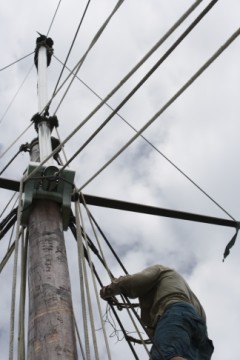
Lista is gently rocking from side to side as the sun ebbs below the horizon. Dave is constructing our new ‘bean-pole’ to heaven, a stairway of ‘ratlins’ (a ladder of wooden bars attached to Lista’s stays) which will provide rapid access to the top of the mast and I have been painting the seams between the planks on her hull. A normal day of mending and constructing aboard our floating stead, yet there is very little of the normal about our present abode...
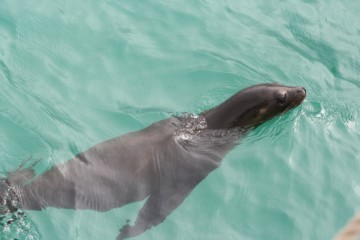
As I dangle my purulent paws (my sister’s coinage) over the dinghy’s side, three sea lions effortlessly glide on their backs past my big toe and nonchalantly intertwine below Lista’s hull. On the spreaders above Dave’s head a magnificent frigatebird lords and from the cap’n’s lofty ladder he traces the passage of a giant manta ray.
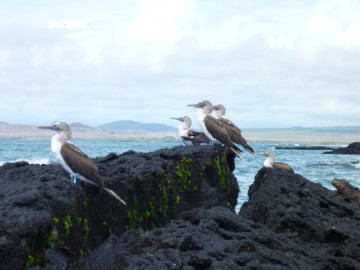
Finally we have arrived in the Galapagos, after 17 days at sea from Las Perlas Islands just south of Panama. A journey of inhaling, spluttering, wafting wind, but rarely wind adequate to thrust our cart horse off her starting blocks.
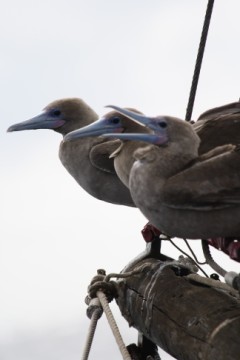
Although Lista was unable to attract wind, her ample bowsprit proved the perfect perch for a passing posy of red-footed boobies. An enterprising young lass finally cracked how to land amid the updrafts and backwinds of Lista’s sails. Thence followed hour upon hour of meticulous preening, with a resulting ‘do’ the like of which a Parisian salon would surely be proud. Her presence soon attracted other red-foots and over the next five days the number on guard grew to three, with occasional extras attempting landings, to be swiftly cursed and booted off.
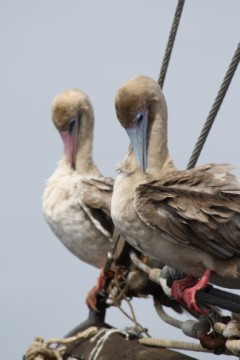
Our seabird work in the Lesser Antilles was invariably swift: diving into the sea, scrambling onto an island and interrogating all nesting inhabitants on details of name and brood size, before crashing through the surf to the next outpost. There was seldom time to watch their day to day antics. Having one of our 17 species on the bowsprit finally allowed us to observe their behaviour ‘beyond the bedroom’:-
• 0500-0700: Early morning fishing foray.
• 0700- 1600: Preening, punctuated by four to five rapid fishing manoeuvres.
• 1600- 1800: Last light fishing foray.
• 1800-0500: Head neatly stowed under wing, occasionally extracted to check on proceedings.
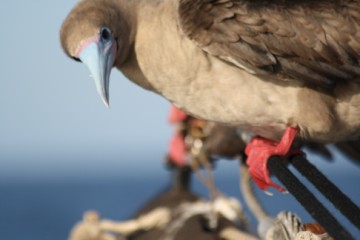
Although we had plenty of interest from passing boobies, juveniles in particular, whilst surveying the Lesser Antilles, none had actually managed to land whilst Lista was underway. Our passage from Trinidad to the Galapagos clearly proved more desirable in local avian circles. Barely were Trinidad’s wooded hillsides and rusting oil rigs receding, before an osprey decided to perch atop Lista’s main mast just as day was being snuffed out by night. Our magnificent mascot stayed for over two hours before a particularly harsh swing of the gaff sent it toppling into the night sky. Additional guests to the voyage included a brown booby (incredibly, with yellow webbed feet locked on the wire span atop the gaff of the mainsil, rather than the main mast master suite option) and a brown noddy which preferred our crew mate’s head.
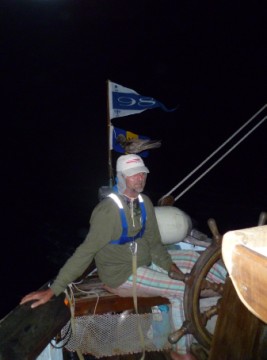
Thus, I return to the theme of ‘visitors’ (invited or otherwise). A theme that has sprung and coiled its way through previous logs, but in our often lonely peregrinations, one that has become a crucial element. On departing Trinidad, Meghan and Joe hooked a ride to Bonaire. On night watches, Joe regaled us of his adventures after ‘Walking out one Midsummer’s day’ from his home in Dorset, meandering through South Devon, France, Eastern Europe and Iran. A young carpenter by trade, he sawed and joined his path to the front doors of eccentric Austrian’s and to the richly laden tables of Serbians. Meghan conjured an entirely novelle view of Australia, growing up amongst her extended family, ‘coached’ by her intrepid granny on bush tucker and survival, before unleashing her energy on rowing and then the world.
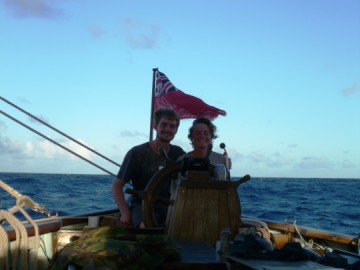
On reaching Bonaire, Meghan and Joe departed for Venezuela to begin their South American travel odysseys. We sought Sam, the sole reason for our repose in Bonaire. Sam is not a rare bird, nor an acronym for a bird study, nope, Sam is real human flesh and a Yorkshire man at that. He has run the rugged skylines of the peaks and fells of dear England, but finally retreated to the least soggiest corner of the world amid the Mexican looking cacti and spiked acacias and aloe of his ‘kunuku’- meaning small holding or farmstead in English parlance, not ‘nooky’ as it might suggest.
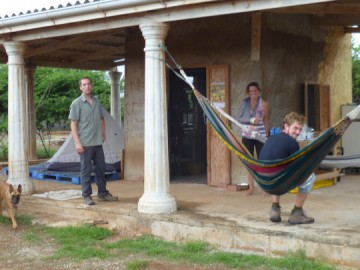
So commenced four or five precious days of bliss. We ran along salt lakes with dabbling flamingos, up stony, spiky tracks, along boulders and cliffs with views out to sea. A crested caracara broke through a lattice of thorns and as the light waned, we watched nightjars (pauraque) flitter from their road side perches, gaping mouths, in pursuit of moths. Serin, Sam’s dog, accompanied us in donkey avoidance training mode, but the straining lunges on the leash suggested she had not quite grasped the topic.
Sam’s crested caracara image bellow
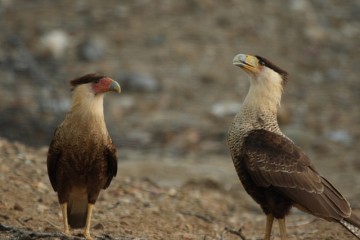
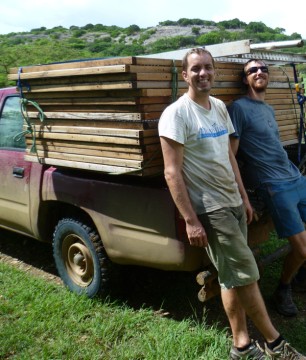
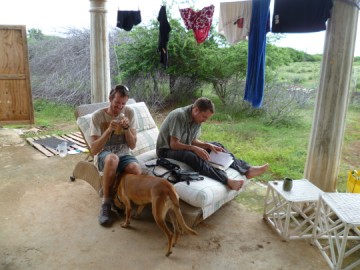
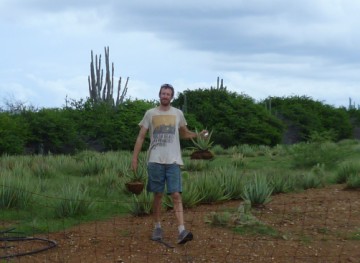
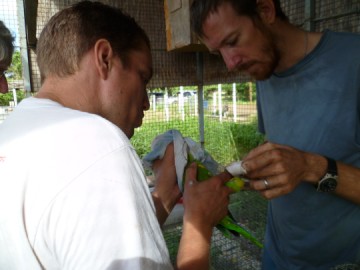
Sam is a psittacine specialist; he knows all there is to know about parrots and their allies. The endangered yellow shouldered Amazon parrots of Bonaire are the reason for his allegiance to the island. He is currently setting up a charity, ECHO, to conserve the parrots and their habitat. It involves a multitude of priorities from habitat restoration, release of illegally captured birds to education. To find out more about his exciting work check out: www.echobonaire.org; to support Echo and have your donation matched look at: http://www.razoo.com/story/Echo-And-The-Yellow-Shouldered-Amazon-Parrot and to find out the latest news visit: www.facebook.com/echobonaire.org
Sam’s yellow shouldered Amazon Parrot image bellow
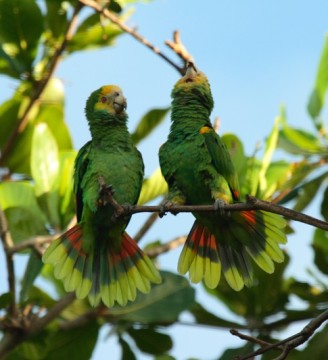
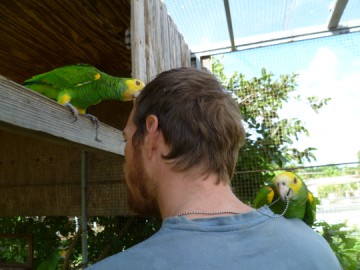
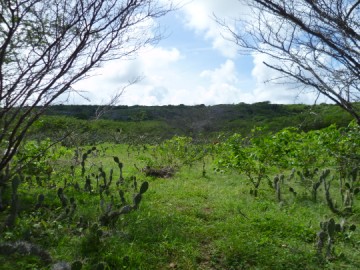
My preconceptions of Bonaire were primarily of its arid nature, with its xerophytic vegetation testimony to this. On Lista Light’s arrival the heaven’s opened and after a four hour wait in the doctor’s surgery, I stepped out and in to a river, newly formed and forging down the high street. Corrugated iron sheets were busily freeing themselves from roof tops and flip flops were speeding past atop the torrents of water. Lista was of course revelling in the unlikely weather and bucking at the seafront, whilst heading rather too close to the concrete promenade in the unusual onshore wind. Journeys to Sam’s kunuku transformed into a mud fest, as we skidded towards ponds and plummeted into watery potholes, with the pickup spluttering in disgust at our antics.
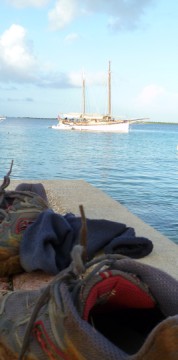
The final lunch dawned. Sam boarded Lista with a pan of steaming mushroom soup. Whilst in the Caribbean we frequented local markets, gathering tips from the women (the fruit and veg. markets are chiefly the preside of wizened, garrulous women) about how they cooked with delights such as: coconuts, soursops, christophines, ginger, okra, yams, sweet potatoes, callaloo and bread fruit. There were no apples, no strawberries, few carrots, occasional lousy looking lettuces, definitely not mushrooms. So we did not eat mushrooms or any of our native fair. Incidentally, the Chinese had a complete monopoly on the garlic! The Caribbean is perfectly suited to growing it, but no doubt some political wrangling ensured its import (such ploys were evident throughout the chain, most blatantly visible in the fish markets funded by the Japanese to elicit pro whaling votes). Back to the veg. stores; tomatoes, though present, appeared not to be a food eaten locally, thus the stock base for so many ‘English’ meals was wiped from our menu and replaced by coconuts. We steamed the sweetest imaginable pumpkin, sipped ginger and lime tea; nutmegs and ginger infused coconut curries and ‘oil downs’ simmered on the stove, replete with pigs’ ears and bread fruit. The result was an explosion of new scents, textures and tastes wafting through the galley, but also a heightened reverence for our own humble English fair. We stopped drinking milk and not a single spoon of clotted cream has passed my lips since our enchanted April at home. The fragrances of gooseberries, black currents, parsnips, swedes, brussel sprouts and wild strawberries lie unmolested awaiting our return, along with the scratch of a hedgerow and the call of the curlew. Briefly, however, we were transported to the hearthside with the creamiest of mushroom soups.
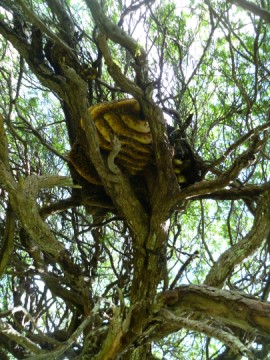
Our next landfall was Panama, amid waiting tankers and container ships, like a doctor’s waiting room for giants. Horror stories of boats being pronged by tankers or swinging, marooned on tearing lines as the lock water swished away beneath them, mingled with reports of monumental waiting periods clanged in our ears. We were under pressure to head east and south before the austral winter would ramp up the high latitude waves and wind along our proposed passage to Chile, so a long period of waiting to transit the canal was a worrying proposition. Thus primed, Dave swung into action and within the day we had an agent and two extra line handlers (a prerequisite) a heap of tyres and lines (also a must) and a meeting booked with the canal officials.
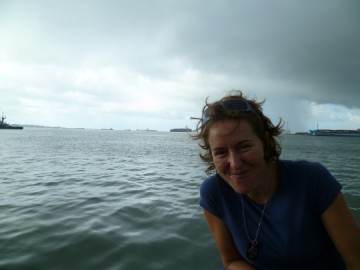
At the allotted time, two pressed and laundered figures stepped aboard Lista. They sidled into a vacant spot beside the buckets and soap nuts and we eyed each other between lines of washing and heaps of wood awaiting construction. Not exactly the ‘super yacht’ or pristine ‘cruiser’ they were accustomed too, but soon Dave had them snickering and the wads of forms and counterparts were to our relief being signed. Lista was measured and evaluated to ascertain whether she nestled in the under 50 ft. category or the far pricier 50-75 ft. category. Unfortunately, even after our protestations that we could ‘shorten’ Lista by removing brackets and bowsprits there was no appetite to shorten the bill and she nosed in, by a matter of centimetres, into the higher category. The ‘heads’ (throne) was inspected (I’m not sure what they expected to be lurking there?) and bottled water was requested to sustain the pilot who would accompany us through the canal. Two days later and we were steaming to the entrance of the canal and awaiting our pilot to join us. With minutes before we were due at the canal gate our pilot (Denzel Washington) jumped aboard from a tug and we sped towards the entrance (Lista does not really speed) with Denzel wildly calling the guards to request that they wait for us to pass (an unlikely order...?). A large arrow swung menacingly to the right channel, but we were steaming left and so pressed on.
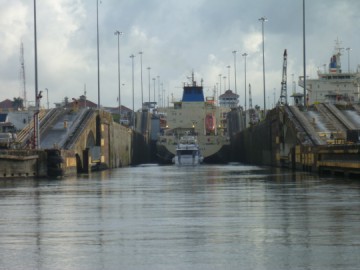
Miraculously, the gates were just grinding open and we slipped into place behind a glitzy motor yacht. On the command of our pilot’s whistle, four line handlers standing atop the canal’s concrete walls on either side of us, hurled a monkey fist attached to a coil of rope (with hawk eye accuracy and gaucho precision) at the onboard line handlers (the crew and I). On receiving them, we attached them to our lines (two; from starboard and port astern and two from the bow) and quickly fed them back to the waiting handlers. Thus, Lista was ceremoniously walked, lines held between the crew and the line handlers, along the canal network like an over grown infant. On reaching Gatun Lock, the line handlers secured the four lines to bollards and we secured ours to Lista’s Sampson posts. The line handlers disappeared and we were left to the gushing water, with the four of us paying out and tightening the lines as the water level dropped and rose accordingly. So this charade progressed, until we had passed through Gatum Locks and were finally in the inner sanctum of the canal and found a large buoy to spend the night amid the towering rainforest.
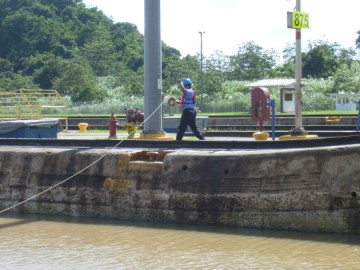
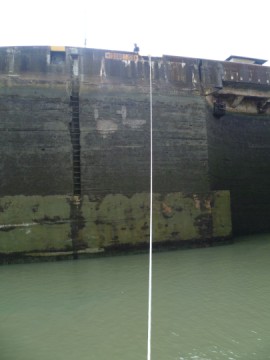
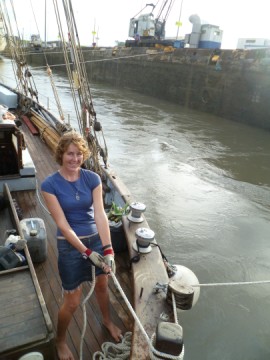
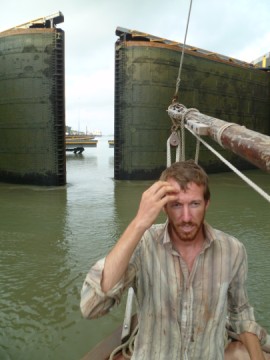
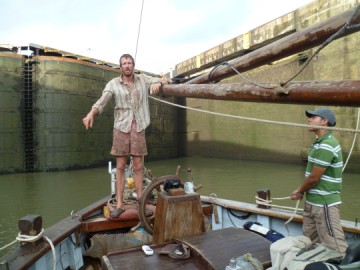
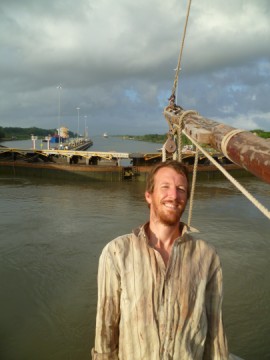
At 0600 the next morning we were up and motoring towards the next set of locks (Pedro Miguel and the final lock; Mira Flores) with our second pilot (Francesco) who had been drafted in that morning. With ranks of sodden washing steaming in the first sun in days (the washing had become progressively damp and stinking over the past day or two in the incessant downpours) we plugged our way towards the Pacific.
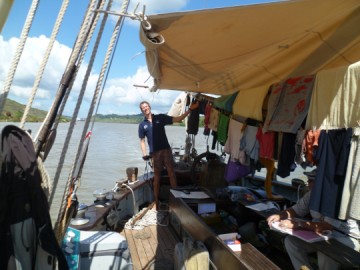
The rainforest surrounding the canal was stunning and a large part likely untouched (well apart from the drowning and cutting of swathes to make way for the canal’s construction). We passed the Smithsonian Tropical Research Institute buildings on Barro Colorado Island and wondered at how weird it must feel to be in one eye ogling forest hard wood giants and through the other to be watching man’s own counterpart, the mammoth ocean liners chugging passed. A second canal is currently being excavated, to allow passage of even larger super super tankers. Bulldozers and trucks are flailing amber earth and gauging out further chunks of rainforest. Humans are a bizarre bunch, research has proven that we are happiest and most healthy when surrounded by green living communities, yet we seem hell bent on their destruction and with them our own?
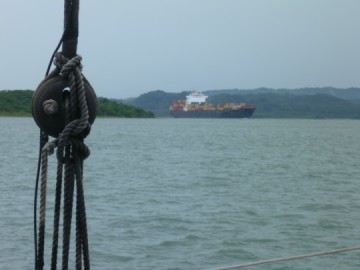
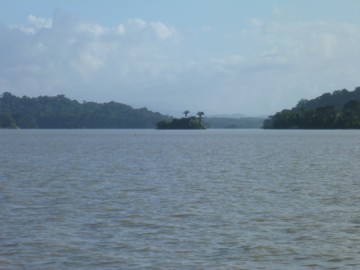
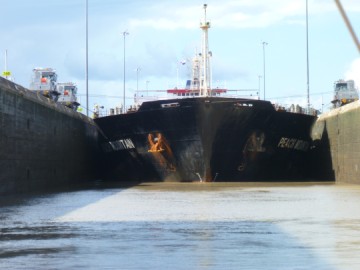
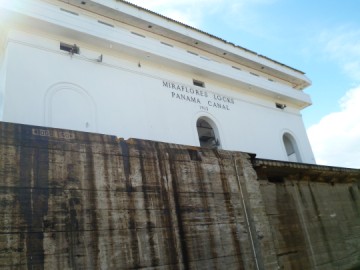
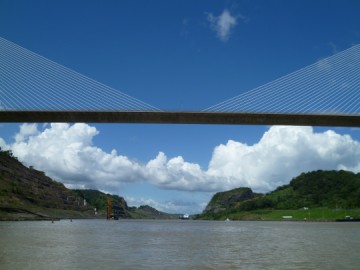
A brown pelican perched atop the final lock gate and marked our entrance to the Pacific whose vast, lonely recesses we were about to explore.
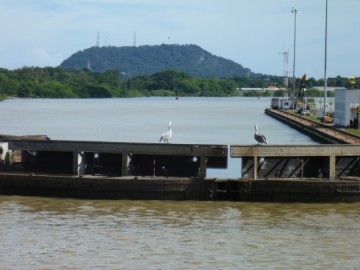
We slipped into an anchorage amongst other yachties variously waiting for a canal passage or for fair winds to take them to the Galapagos and the Pacific islands beyond. An improbable skyline of skyscrapers and giant flashing TVs outlined Panama City, providing an unusual backdrop for our country bath tub. The ensuing days continued as many others, with construction projects to equip us for the southern seas, including a new dog house and square rig, as well as final edits to the seabird atlas as we bided our time until the second crew member arrived.
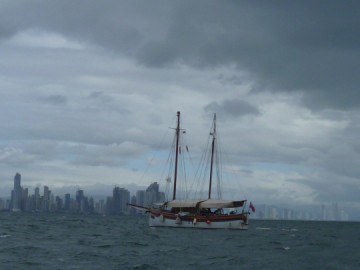
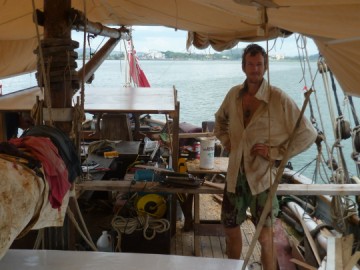
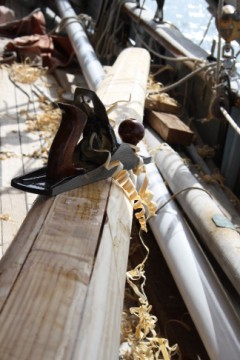
Every day, Dave scrambled off on his bike, memorizing the locations of feretarias (hardware stores), marine stores (virtually non existence/extinct) and various sundry suppliers along Panama’s choked and labyrinthine cityscape, as he collected spares and fittings for our journey. We found gas, water, fuel and a fantastic fruit and veg. market. This was the highlight of Panama for us both! Replete with panniers and the bike trailer we found the entrance into what looked like a prison. Beyond the gates an Eden of every possible tropical fruit and vegetable beckoned. Sellers specialised in oranges or watermelons, pumpkins or tomatoes, similar I imagined to the ancient Roman shop keepers selling only one commodity from their open fronted ‘stalls’. Plump, glossy fruit towered all around us and I was finding it increasingly difficult to resist the need to gather specimens from all. Sparkling old men eyed us and the trailer and unleashed torrents of Spanish, with even our painful quasi Spanish-French offerings failing to subdue their chatter, due to our lofty status as the hallowed bike trailer owners.
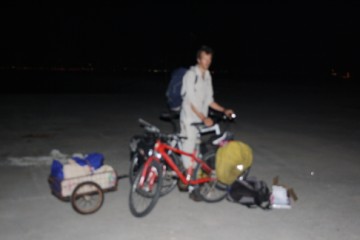
Finally, we left the market and teetered down the dual carriageway with a trailer loaded to the gunnels, panniers stuffed and bags bursting. These shopping forays have become a signature note to our travels, as mountains of provisions are stuffed into Lista’s folds to full our bellies for the weeks at sea. As I speak, avocados, onions, cabbages, lemons and figs (finger bananas) sway in their nets above my head on our tenth day at sea and ranks of cans and bags of pasta, rice, beans and flour fill the lockers.
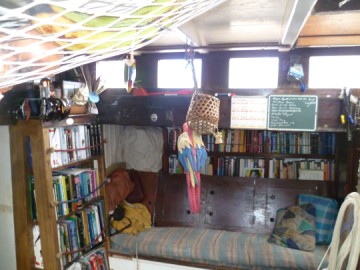
The trailer and loaded bikes have been a talking point wherever we have shopped and locals have grinned and giggled or stared on in disbelief as the crazy English packhorses have lurched away, often pursuing us with stray packets of nuts or pots of jams that have sought freedom. The volume of food necessary for ocean passages is daunting. One night nearing Christmas, we sat under two loaded trolleys in a crowded Panama City supermarket with, ‘Jingle Bells’, echoing down the aisles in Spanish, I could barely rise from my haunches to gather another tin of pigeon peas or a packet of oats. From Grand Canaria to Morocco (not exactly the same- see the log...) St. Maarten to Trinidad and Panama, cashiers have stared goggle eyed at the mountains of stores passing their till. This is invariably followed by the fight to use our own ruck sacks and cloth bags, universally disputed and maligned, before we topple off to a pillar outside. Then much to the horror of the desk bag handler and tip extortionist, rather than calling his assistance to stack a gleaming range rover, we attempt to work out how on the earth it will all squeeze aboard our flea bitten bikes. On the Panama night, finally departing, with Dave and the trustee trailer bobbing over pot holes in front of me, merrily passing the ‘no bike’ sign onto the dual carriage way, I watched as packet after packet of noodles and oats leapt out. It was the funniest sight and we guffawed in the carriage way siding at the unusual course our lives were taking.
Finally, after this rather chaotic amble through our passage to the Pacific, we are nearing the Galapagos where I began this story. We cannot, however, arrive without a mention of Las Perlas Islands, these enchanted wild islands where we watched thousands of Neotropical cormorants pour into our wooded bay in a whirring, swarming frenzied feeding mass, following unknown sensory cues and inherited migratory lines.

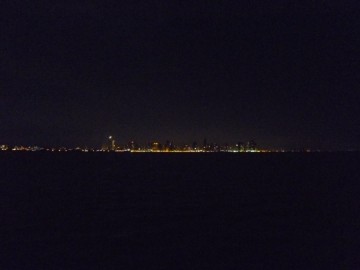
Scrambling from Panama City’s gaudy skyline on Chrismas Eve, we arrived in Las Perlas on Christmas day and swam with the biggest rainbow parrot fish I have ever seen. Dave and I roasted a chicken, garlic, onions and potatoes, sautéed pumpkins and courgettes and created a lemon-passion fruit cheesecake, before retreating to our cabin to devour letters and cards from home and to re-read emails. These nuggets brighten our days, whether from Anne talking of pickling, jamming and stoking the fire, Carole describing Tallula’s misadventures, Roddy sewing seeds, Lucy finding hinds in the coombes, the other Lucy amongst broad beans, Andy flying his hawk, Jane with her quails, Jenny in the sodden lanes, Fiona atop a mountain, Kate eyeing her long baby, Mary and Colin (Wallace and Grommit) inventing a fine solar powered plant incubation device, a rye Rosco comment or a line of banter from Tom... They all feed peals of laughter, before crushing our home sick hearts and sending tears rolling down our cheeks.
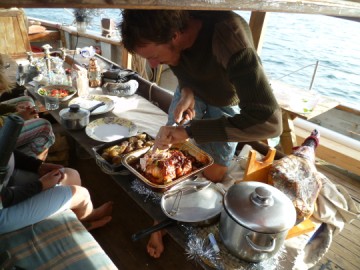
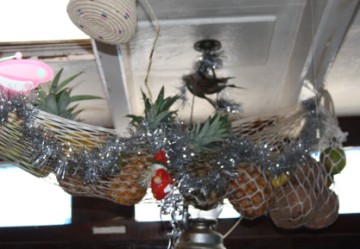
Outside, Martha’s bunting flickered in Lista’s rigging, while down below her Christmas stocking and Jake’s Christmas pants ribboned the galley. There was no Christmas tree, but the brown pelicans, magnificent frigatebirds and brown boobies provided the decorations on the trees on ‘bird island’ by our side. On New Year’s Eve we paddled to an island across the sound with eggs and bread dough. We collected fire wood nestled amid the flotsam of flipflops, trainers, plastic bottles, floats, dolls and fishing nets. Sipping wine and munching on bread sticks flamed by the fire and eggs fried in clam shells, we both agreed that we had never dined in a finer restaurant. Slinking into our hammocks, our night’s sleep was not quite as idyllic. Unbelievably, I felt sick after hardly a nose gay of vino tinto, whilst Dave spent the night on the local midge menu.
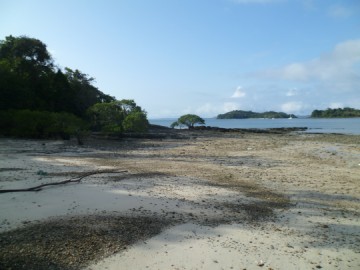
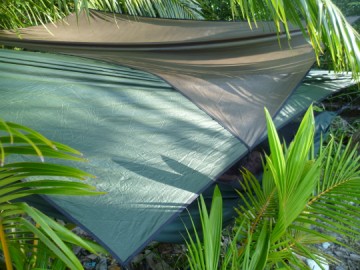
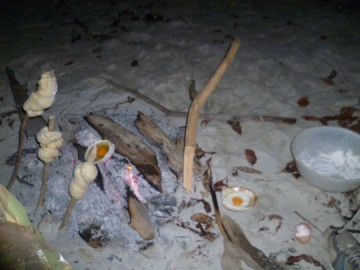
On route to the Galapagos, the infamous doldrums deflated our sails and progress, eventually sending us unexpectedly to the shores of Manta, Ecuador. We flung the hook to catch a couple of days of deck work, as we still had not conquered the leaks that created mini pools down below. The fishermen appeared interested and sidled over to offer help in blue and yellow fibreglass skiffs, recognizing a boat in need (well, technically she was sinking, with only the bilge pump keeping her ‘alive’) and to request, ‘cigarrillos’, coco-cola or at worst, ‘agua’.
After such kind offerings it was rather unfortunate when a port captain arrived and bustled down below without an invited, looking for… I’m not sure exactly? We had hoped that the sight of girt holes in our decks might allow us an emergency stop, as long as we did not venture ashore. The squat, swarthy Ecuadorian was not convinced and our pathetic Spanish was obliterated by the onslaught of verbiage. Brandishing a dictionary we found the crux of the matter, ‘cancelar’, or fee, a word that was to become very familiar and that appeared to be growing by extortionate amounts from this increasingly vexed man’s lips. This was swiftly followed by an internationally recognised sign; our captain clutching his wrists alternately and beckoning suspiciously to David. Nasty. In deadlock, Dave motioned to go with el capitan and collected the boat papers. Instead of money, the captain was receiving David, clearly not the desired outcome. Within a split second the stage setting had flipped and he was barking that we must leave immediately, no $5000 cancelar, not even $20, but departure, ‘or else’!
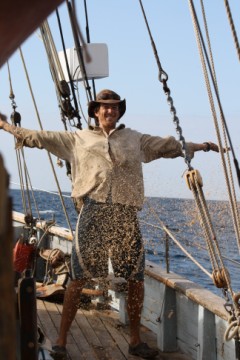
We rapidly wrenched up the anchor and limped off with gaping holes in Lista’s decks. A couple of miles off the coast of Ecuador, we ‘heaved-to’ and watched waves cascade through the holes as we pitched in the rolling sea. Determined to stop the ingress, we worked until late into the night under fading head torches. Rotten planks were prised up and new wood fitted; degraded oakham and pitch were gauged out of seams between decent boards and then ‘gagged’ with fresh oakham and sealed with hot pitch. Pouring pitch is a tricky manoeuvre at best and became more and more elaborate. The seams are meant to be neat, regimental black lines. Our seams meandered and soon derailed into ‘Picaso-esk’ brush strokes, whilst we deteriorated into a giggling heap.
Drafts of fishing pirogues churned from the shores of Ecuador, often in shoals of three or four. Generally, one man drove and one or two men sat by two 10m-odd bamboo rods, posted astern trawling long-lines. After the ‘el capitan’ incident we were rather concerned that they were fleets of co-conspirators on a mission to capture us, that we had misunderstood his flailing hand gestures and we were again destined for prison. Luckily, they waved and parted around us, often yelling for the ubiquitous fair. They were not all as convivial, however, with one operator clearly irritated by our presence, snarling and clenching his fist at the suspected gringo fishing competitors.
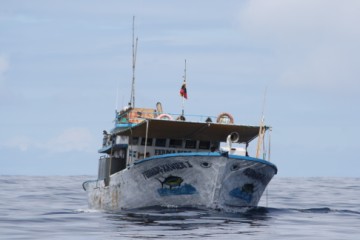
One large boat with at least ten men aboard was crisscrossing back and forward posting out his miles of lines. Clearly concerned that we might destroy one in our propeller, he hailed us on the radio. Thus commenced a Basil Fawlty style conflab, where void of hand gestures we stuttered, screeched, ummed and ahhhed in our mutual misunderstanding of one another. Undeterred, ‘el pecador’ continued to radio, ‘Leesky Lie’, checking our progress and ‘rumbo’- how round we were??? (we subsequently found to be ‘our course’) and generally chat. Of course, I too rather enjoyed airing my flaky Spanish and so I proffered my name, age and where I came from (unfortunately, last night’s lesson had not provided any more lucid topics). Eventually the boat and his lines faded on the horizon, but ‘Leesky Lie’ will most definitely live on!
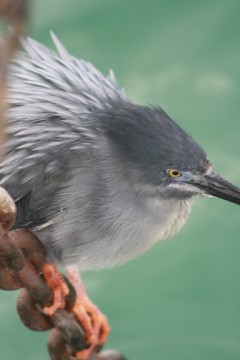
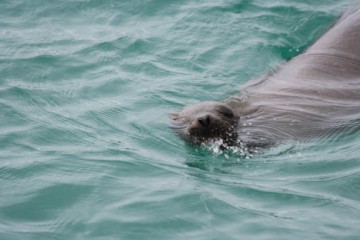
Galapagos is famed worldwide for its natural endemic wonders, with island speciation causing remarkable evolutionary twists, with finches using tools, boasting small or fat beaks and tortoises with long or squat necks in their race for the survival of the fittest. Here, is the birth place of evolution, the setting for Darwin’s laboratory where he began to understand and visualise the concept that would shake Victorian Britain, its religion and preconceptions. I had been warned of litter and tourism and so my hopes were low. Dave had visited before, over five years ago with his parents on their Pacific crossing and observed both the tourism monster, but also revelled in the ruby Sally light-foot crabs, boisterous sea lions and a horseback ride atop a volcano. Unfortunately, this time, the sailing has clearly taken its toll on the poor old boy...........
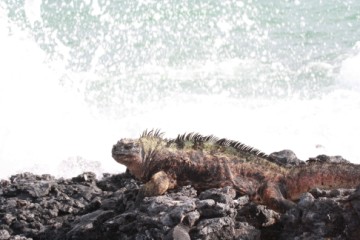
Our Galapagos was unusual. We sat at port and worked on Lista. Instead of churning off on tourist boats and guided excursions in search of wildlife highlights... the wildlife came to us! Massive green turtles snuffled air by our side (there was no size comparison in the Caribbean where turtles are on the menu) eagle rays flipped in mid air, blue-footed boobies launched an arsenal of attacks on the shoals of fish; dropping like daggers from dizzying heights at 40 degree angles. I donned mask and clutched sand paper to begin relieving Lista’s hull of its barnacles and weed accumulated from our ocean passage, only to find that it had all gone! The cleaners had been in; large spotted fish and potentially, the sea lions had wiped her surface clean! ‘Tube noses’ a group of birds we were accustomed to viewing only far out at sea, buzzed across the bay’s surface, including rotund, Galapagos shearwaters and Galapagos (or wedge-rumped storm-petrel) and Elliot’s storm petrel pattering the surface for plankton.
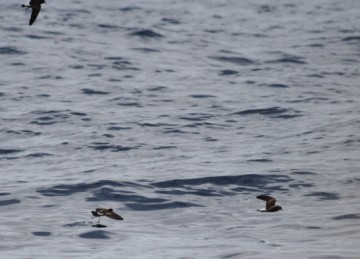
In the early morning we were rudely awoken by magnificent frigatebirds chittering on the main mast as an interloper attempted to oust the present occupant from its perch. The blue-footed boobies whistled (the males) and honked (the females), tiny Galapagos penguins lanced bait balls of fish below Lista and work was ceaselessly halted by the latest visitor to the boat.
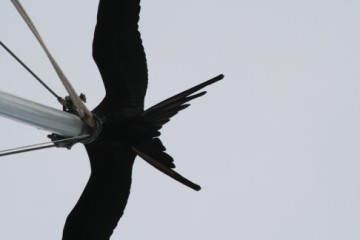
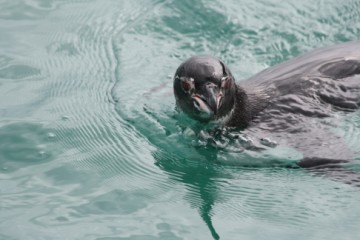
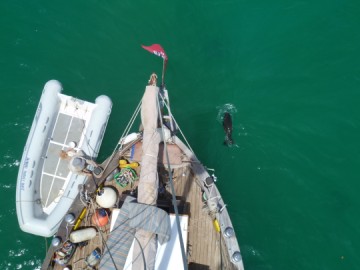
Lista, true to form, was transporting large quantities of water through the bilge, necessitating frequent pumping. With the floor boards up we traced the leek and Dave plunged below with an air tank and copper ‘tingle’ (equivalent to a metal plaster). Of course, being the Galapagos, he was not left for long without attracting an audience. As he tapped the copper tacks in place, a sea lion nosed into view and for the next hour rolled and shimmied around him, disappearing under the keel, before bursting out in front of him, in a never ending game of hide and seek. Meanwhile, I painted Lista’s seams and a fish bit my big toe, a sea lion swam between my legs and two young brown pelicans could not resist paddling right at my side. Complete chaos!
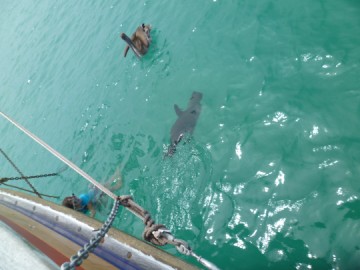
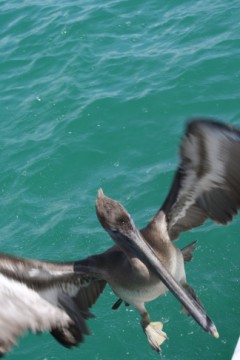
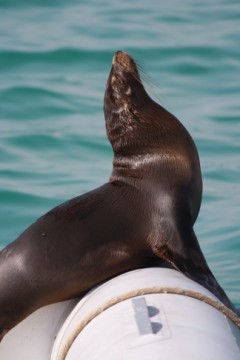
One morning we awoke to a brown pelican on the cabin top, two sea lions in the kayak seats and a pelican at their bow. Clearly they felt they would do a better job running the ship! The sea lions and the pelicans could not be more different in temperament. The pelicans were animals of necessity whether feeding, fishing, preening or roosting. In contrast the sea lions appeared to revel in play and mischief. They plunged after shoals of fish, quickly to be distracted for play. This involved biting at pitiful puffer fish until they blew up and floated on the surface and cavorting after one another or us. One evening, a young sea lion apparently ‘flipped’, just as I have observed each of our dogs suddenly going crazy with exuberance in the garden and running round and round in circles. The sea lion swam in ceaseless circles and arcs, jumped from the kayak, jumped back on, tugged at the seat and then spat it out.... and so the frenzied play proceeded until the final affront, when it leapt from the water onto a pelican that was minding its own business on the front of the kayak!
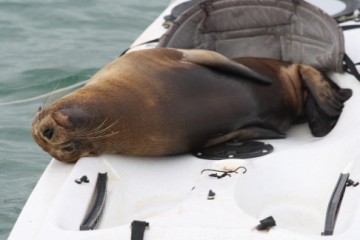
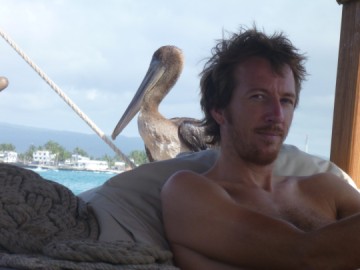
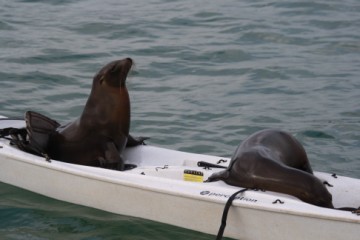
Less welcome arrivals were the flies, droves of them. Particularly ferocious buzzing would signal amour. Horrified, I discovered clustered of hard eggs in little snowy bouquets, stuck to the side of a fish bowl or near the ham. Fly strips, supporting tens of sticky comrades dangled like macabre Christmas decorations from the salon and galley, but it was near impossible to abate the onslaught and soon armies of maggots were marching across the sink top or along the chopping boards. Maggots had arrived in unexpected places in the Caribbean (within washing that was put out to soak for example) but never on this scale. The mystery of the invasion was never solved…
Dave’s warm recollections of the ride on the volcano and my need to be atop of a horse, pulled us a way from Lista and on to an official tourist tour (it was mandatory to have a guide). We managed to wrangle a trip with just the two of us and decided that rather than being driven up to the volcano we would run. Thus we dragged ourselves ashore in the early morning and ran through the streets of Isabela, out and up through a panorama of black larva, scrambling climbers and cacti. After about one and a half hours of running and the start of the more verdant vegetation zone that marches with altitude up the slopes of the volcano, a truck finally hooted and heaved us aboard. Crouched in the back, we watched the vegetation grow until tall trees lined the road dripping with moisture and epiphytes. It was a wonderful contrast to the arid low lands.
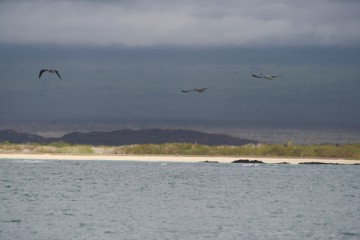
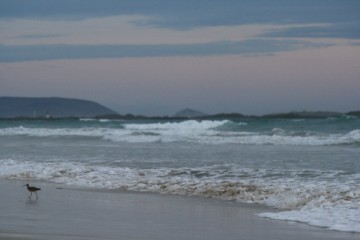
We were deposited at a hut where two horses were waiting. The guide alit and we drank copious water and changed, whilst the pick-up roared off. As we sat and chatted, with rain trickling off the roof of the shelter, sniffing mint leaves, it suddenly dawned upon us that we were missing a horse; surely the guide was not going to lead us? Troubled, we broached the subject with him. A misunderstanding had indeed occurred and it appeared that he was expecting to guide us as we walked. The whole point of the trip was the horses. Thus ensued a period of plotting and scams in an attempt to procure some replacements. Finally, with a tap of his heels (one of many beguiling traits) our grinning guide summoned the pickup and we roared back down the volcano in search of horses.
We supposed our guide and pick-up accomplices knew of a hacienda and suitable horses. Apparently not. We veered down a soggy track, screeched to a halt and after much neck craning reversed back down the pot-holed track. Our fingers locked around the pick-up bars and rain sluiced down our backs. With a flourish, the green plastic poncho that our guide had been sporting along with white sun glasses (he was really more at home in his beach bar than showing tourists the soggy volcano) was thrust through the window. An old grey nag appeared out of the mist of the rain, tethered on a grass verge. I desperately hoped this was not to be our mount.. but no one was around and so our quest continued. Any gaucho plodding down the road was hailed and his horse demanded, but alas the plot was failing. We rocked up to the gates of a small holding. Everyone disgorged out of the pick-up and a shy young farm hand was hailed. He shook his head at our request. We stood defeeted. Finger bananas were demanded and we all sat and munched. Finally, the guide aired the options, either we continued searching for horses which would require more money (we had already paid substantially for the non-volcanic event) or we drive back to town. We looked up. Nodding down the road was a chestnut horse with a farmer slouched atop, the owner of the farm. The guide attempted a final appeal on our behalf and can you believe it, he agreed!
They all filed back into the pick-up and with a wink, Houdini departed and we were left open-mouthed at the gates of the farm. Not entirely sure what was agreed, we never-the-less were given two steeds. I motioned potential routes and the farmer nodded gleefully. Finally we had horses (ponies) and we headed off up the road. My wee bay mare was as quick as a train, her walk equalling Dave’s chestnut’s trot (not forgetting the poor gelding had already been ridden by the broad farmer once already today). We walked and walked and occasionally trotted and cantered, exploring any tracks or turning. Wood pasture, guavas (a rampant invasive) cattle and high tussock grasses stretched in a patchwork at our side. It was utterly beautiful and better still we were alone!
We found a park trail and dodged under the entrance banner and meandered through the bush, finding a grotto where a sign indicated that wild boar were caught historically. A greenhouse came into view and with it two waving gents, motioning that riding was forbidden, but appeared quite happy for us to continue on our way. As you will know, Dave’s legs continue for some way. Folding them up, like a long frog, is not the most comfortable of postures. After the hour and a half mark, the stance was clearly bearing its toll and the horses began to protest at yet another detour. Sadly, we turned around, lacking the know-how of whether a potential circular route would ever return us home. It seemed the farmer had similar concerns, as when we finally rocked up, he was standing outside the gates with the relief in his eyes matching the horses!
Basking in our unlikely luck, we meandered home stuffing passing pawpaws and munching on pineapples and bananas given to us by the farmer. On reaching the main road, a bus flashed us. We had fatefully bumped into the tourist operator who felt aggrieved that he had missed out on part of the proposed guided walk fee (we had only paid half, feeling this was fair as the ‘goods’ were not delivered and we did not actually do the walk). He insisted he would collect us on his return from the volcano. Meanwhile, we sloped off unmolested. Not wishing to be press-ganged by the man, we haled a clapped out old truck and the Señor and Senora allowed us to hop in the back. Water boiled through the seam between the ply board and the cabin as rain sloshed down. We were dripping but elated on avoiding our foe (even if I did cower out of sight whenever a vehicle overtook). We did return to the tourist ‘outfit’ to discuss the misunderstanding and after remonstrations and their final play at looking greatly aggrieved for our failed excursion, we all parted amicably.
The bureaucracy was not quite as fun. That is, apart from the initial visit when a boatload of officials boarded Lista with their top sniffer dog. Whilst the dog and handler snuffled through our belongings, one yellow-shirted guy mock steered at the helm, whilst the other snapped photos. The yellow-shirted guy then padded down stairs looked through the book collection smiling, bounced on the seats and ogled the ancient paddle wheel. Meanwhile stealth dog had found the pork netting and was busily chewing, clearly her last breakfast was already waning and her ample nose had sniffed out not drugs, but a tasty wolverine snack.
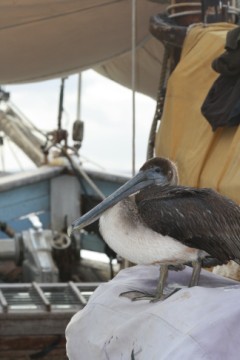
On the downside, during our 17 day visit, we accrued twenty meetings with the port captains. Our Spanish was shocking, but we ‘habloed’ onwards and thought we were getting somewhere until yet another change of guard would come to the boat and ask us, ‘What we were doing?’ and ‘When we were going?’ Nearly daily we would slog to the office and arrange meetings, to be told to return at another time and so it went on and on and we thought they would have surely been sick of the sight of us. Eventually, on the final day we had spent all our money, nada remaining and with no cash machine or bank accepting us we were ready to depart with new supplies purchased and the final fee paid. All so we thought, on arriving to the captain’s office it appeared that an extra fee was due. Our crew mates who had arrived back from outings, were reluctant to lend us the money and so we were trapped, with officials who had been keen to boot us out now preventing our departure.
There was one hope. As we were working on Lista a local guide had motored up to us with his children and asked of Lista’s origin, but particularly of how our solar power was working. He was a gent, interested and interesting, but we did not catch his name and away he went. One evening, whilst walking through the town a couple of days later a man stopped us on his bike, it was the guide. He invited us to a drink at his friend’s cafe. So we sat and chatted to this Ecuadorian- German about natural history, the Galapagos, solar energy, tourism, the environment, his music and Lista. He was a kindred sole and the exact point to our visit to town was soon forgotten.
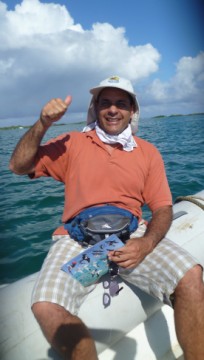
Thus, on the eve of our departure we sought Mathias with the uncomfortable request of a loan of US$160 which we could not repay until arriving in Chile some months later, where we would finally have access to cash machines. With a chuckle and a broad grin he marched us off to the ‘capitanaria’. Greeting and shaking all the officials hands he confronted the captain and outlined the plan. Somewhat ruffled by Mathias, but clearly impressed by his style, the captain allowed our benefactor to write a cheque, signed our exit papers and finally handed over our passports. We shall never forget Mathias’ incredible generosity and human spirit, a gem amongst so many inferior men. As I write I am painting and Dave is constructing, to ensure that not only the cash is returned but a package fit for a maestro is delivered to the Galapagos.
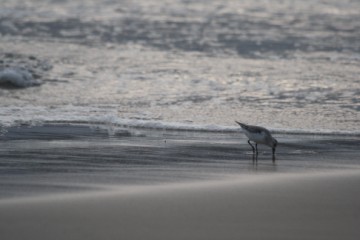
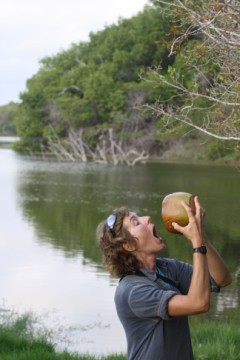
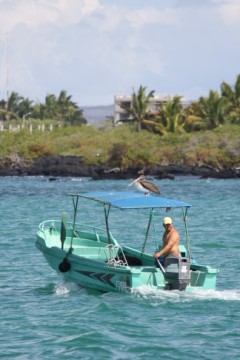
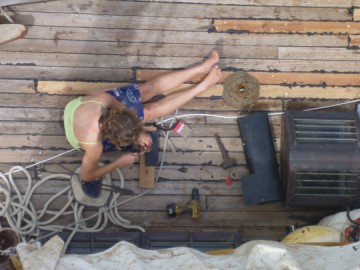
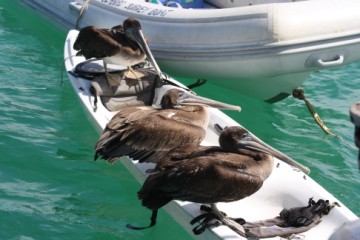
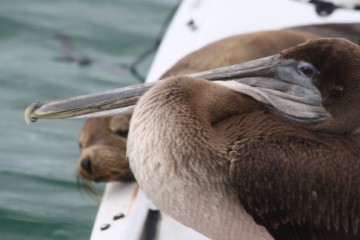
There are so many more memories: from marine iguanas basking in heaps by the sea shore, indistinguishable from rocks; running along the beach and past a giant tortoise; sitting on a bench with a sea lion lying beneath; to drinking blackberry juice and the TVs blaring from every restaurant and corner store. We shall never forget the Galapagos. Mathias refersito it as, ‘Ultimo paraiso’, the name of album he composed. He’s right, I hope it remains so. Most of all, I shall never forget the ‘dance’ of the sealions; somersaulting over and over in a gravity-less dream, her liquid eye watching mine and her flipper briefly touching mine, together we twirled, in a never-ending, dance of the sea lion.
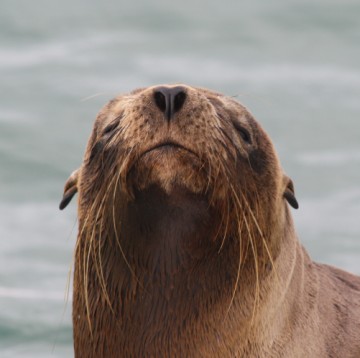
Back to previous section - September to November 2010
Forward to next section - February to March 2011
This page hit Count : 10444
This is the Lista Light Website, for the travels of the sailing boat Lista Light
Click here for text-version of site